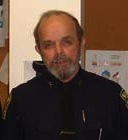November 27, 2012

This article originally appeared in the Dec. 18, 2003 edition of the Reporter.
It was a 209A that hung up Paul Johnston. He left a room full of people in the back of the police station on Gibson Street. He had started as a cop at $22 a week under Boston Police Commissioner Edmund McNamara, and now here he wasn't, a room full of people eyeing cake and looking up at pictures of him in younger days, smartly buttoned in his blues.
Johnston, whose column mocks criminals and poltroons weekly in the pages of this newspaper, is working on his third retirement. He tried being an auto mechanic.
"That didn't work out," deadpanned his boss, Captain Thomas Lee.
He tried walking away from the force again in 1989. Lee: "That didn't work out."
He'll try again in January, 35 years into a career that has people bringing him signed pictures of Ted Williams, Bobby Orr, and Larry Bird.
And the night of Thursday, December 11, with a room full of people lining up to thank him, he was out fighting crime, responding to a domestic disturbance call. It's the type of work that has made his career.
Paul Evans did community policing from Schroeder Plaza, and he goes to London for much money and many crumpets in the House of Windsor. Paul Johnston does community policing on Ronan Street and Faulkner Street, jotting notes over bad coffee at too many civic meetings, applying the personal touch to three-and-a-half decades in uniform.
"He's the type who would go out to somebody's house and talk to them. He's old school, and I appreciate that," said Renie Smith, an aide to City Councillor Maureen Feeney.
Johnston said his brand of community policing came from being "a chronic complainer."
"When I saw things I didn't like, yeah, I was probably thinking to myself: How could we do something different?" Johnston told the room last week. "Why we do it this way, I don't know. I just know that we can do better."
So he's worked at doing it better, revolutionizing the way police handle domestic violence calls in C-11, working with Aimee Thompson on the Close to Home program, which educates and treats those affected by abuse. It's a subject, Johnston said, that he's learned much —maybe too much— about.
"It's something I understand better than I ever did before, how far-reaching it is. It's not just two people. It takes everybody down, whole families, whole neighborhoods."
As a community service officer in C-11 since 1991, he has incubated and encouraged neighborhood crime watches. The Boston Miracle got its face from high-profile clergymen and headline-gobbling suits. It got its feet &—and its eyes and its ears — from cops like Paul Johnston.
Kearney Kirby lives in Uphams Corner. She said she moved in more than a decade ago and didn't know what to think of her new neighborhood, but learned soon enough when she could distinguish between bullet calibers by how they whizzed past her window. Then she talked to Johnston, got involved with community policing, and now sleeps in peace.
"I thank you for the fact that my neighborhood is great now," Kirby told Johnston. "It rocks — in a good way."
Bobby MacEachern, a former pupil of Johnston's in a report-writing class that he said made his job at the Home for Little Wanderers easier, said Johnston is a cross "between a wise professor and Andy Sippewicz," the burly tough guy of "NYPD Blue."
Gloria-Ann Vieria, a young woman who started her crime-fighting career with the Annapolis Street Neighborhood Eye Crime Watch, presented Johnston with the photograph of the three Boston sports legends.
"He's one of the reasons why I got involved in community service," Vieria said, before turning to her mentor. "So I don't know whether to thank you or hate you."
Lee pulled from a thick folder a letter from Charlestown, that had sat in Johnston's file for a long time: before busing, before Acelyne Williams, before the bad days in the early-'90s. Pre-Bill Bratton, back when a broken window was a broken window. It was October 1969 and rookie Johnston was working in Charlestown, where he responded to a call from the sister of a woman with a broken hip.
Gently, gentlemanly, Johnston helped her from her home and down to the hospital.
Her sister, grateful, wrote a letter to the commissioner, who stashed it away so that 35 years later another boss could tug it from a file and tell a room full of people what they already were sure is true about Paul Johnston.
"I want you to know what fine boys are on the police force."
Topics:



